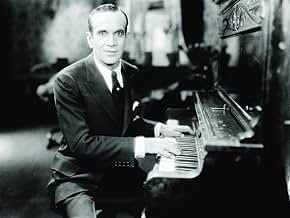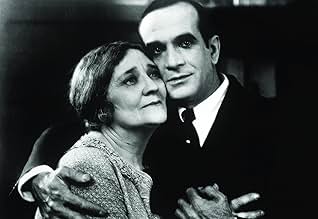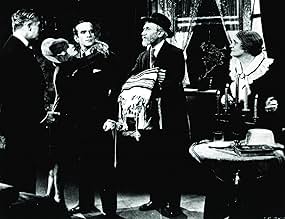Der Sohn eines jüdischen Kantors muss sich den Traditionen seines religiösen Vaters widersetzen, um seinen Traum zu verwirklichen und Jazzsänger zu werden.Der Sohn eines jüdischen Kantors muss sich den Traditionen seines religiösen Vaters widersetzen, um seinen Traum zu verwirklichen und Jazzsänger zu werden.Der Sohn eines jüdischen Kantors muss sich den Traditionen seines religiösen Vaters widersetzen, um seinen Traum zu verwirklichen und Jazzsänger zu werden.
- Für 1 Oscar nominiert
- 3 Gewinne & 1 Nominierung insgesamt
- Jakie Rabinowitz - Age 13
- (as Bobby Gordon)
- Cantor Rosenblatt - Concert Recital
- (as Cantor Joseff Rosenblatt)
- Chorus Girl
- (Nicht genannt)
- Chorus Girl
- (Nicht genannt)
- Small Part
- (Nicht genannt)
- Choreographer - 'April Follies'
- (Nicht genannt)
- Small Part
- (Nicht genannt)
- Violinist
- (Nicht genannt)
- Small Part
- (Nicht genannt)
- Buster Billings
- (Nicht genannt)
- Dance Director
- (Nicht genannt)
Empfohlene Bewertungen
This is a powerful story with interesting characters and good songs, to boot. It was different to see Warner Oland as somebody else besides Charlie Chan. He played Jolson's father and I never would have recognized him had I not read the credits. Nor would I have recognized William Demarest.
Jolson, however, is the man who dominates the film. Some of this songs wound up being classics, ones played for years and years, such as "Toot, Toot Toosie" and "Mammy."
Faced with a very tough decision on what to do with his life, Jolson's character does the right thing in the end, which was nice to see. Overall, it's entertaining.
I'd like to comment on someone else's comments now. Someone said this movie was very racist and that's why it was successful, saying, "Would this film have still been successful if it was just Jolson as himself and not black-faced? Probably not. That's because people watched it to make themselves feel better about themselves."
I wonder if this commenter actually saw the movie. Jolson is only wearing blackface for about 15 minutes for a performance. The rest of the movie, Jolson IS himself. Jolson never plays an African-American as his character in the movie, he just sings a song as one. Yes, the song is somewhat racist by today's standards, but most of this comment is not valid at all. In fact, I suspect the comment was written solely based on a glance at the video box cover.
Anyway, if you wanna see a historical landmark in film or if you wanna see a fabulous movie (half-talkie, half-silent), go ahead and see "The Jazz Singer."
Though, not being the first "talkie", The Jazz Singer, is certainly a remarkable film; it still holds its place as an cinematic landmark for being the first feature-length Hollywood "talke" film in which "spoken dialogue was used as part of the dramatic action." However, it's still largely a silent film with a synchronized musical score and a handful of sound sequences built around singing. It's also become something of a controversial case because of Al Jolson's (arguably the most popular entertainer of his time) use of blackface in some of the musical sequences, forgetful of the fact that this was a theatrical artifice from the era; it wasn't intended as "mean-spirited" as so many claim it to be. It was actually praised by black newspapers in 1927, and was being done by another much defamed minority, a Jew.
You can see what an impact sound must have had in 1927, because it certainly wasn't the movie that made this production a phenomenon. Though, the film itself, is more than just a movie about a guy who likes music. It's also a story about a Jewish kid who turns his back on his heritage to try and make it big on the stage - exceptionally daring subject matter for its era, and still enthralling today. It's certainly not ragged and dull, though, the magic moment when Jolson turns to the camera to announce, "You ain't heard nothing' yet" - a line so loaded with unconscious irony that it still raises a few goose bumps. Audiences were captivated by this and still are to this very day. A must see!!!
Wusstest du schon
- WissenswertesThis is the first feature-length movie with audible dialogue.
- PatzerMary recieves a telegram dated August 8, 1927. Later in the film, Jack is seen writing a letter to Mary, dating it August 7, 1927.
- Zitate
[opening lines, first quote and first words in the first widely-seen talking picture]
Jack Robin: Wait a minute, wait a minute, you ain't heard nothin' yet! Wait a minute, I tell ya! You ain't heard nothin'! You wanna hear "Toot, Toot, Tootsie"? All right, hold on, hold on...
[then he walks back to one of the band members]
Jack Robin: Lou, listen. Play "Toot, Toot, Tootsie", three chorus, you understand. In the third chorus, I whistle. Now give it to 'em hard and heavy, go right ahead.
- VerbindungenEdited into Okay for Sound (1946)
- SoundtracksMy Gal Sal
(1905) (uncredited)
Written by Paul Dresser
Sung by Robert Gordon (dubbed by an unidentified singer)
Top-Auswahl
- How long is The Jazz Singer?Powered by Alexa
- What is 'The Jazz Singer' about?
- Is 'The Jazz Singer' based on a book?
- How does the movie end?
Details
Box Office
- Budget
- 422.000 $ (geschätzt)
- Laufzeit1 Stunde 28 Minuten
- Farbe
- Seitenverhältnis
- 1.33 : 1
Zu dieser Seite beitragen































